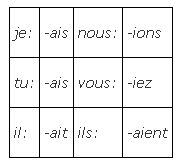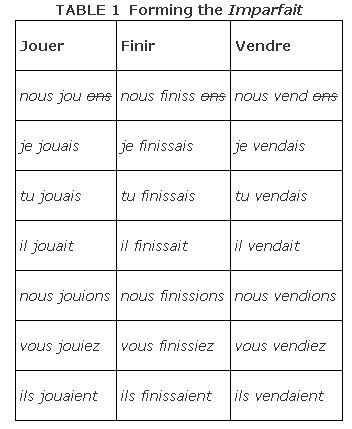The imperfect ( l'imparfait) expresses or describes continued, repeated, habitual actions or incomplete actions, situations, or events in the past. The imperfect describes what was going on at an indefinite time in the past or what used to happen. The imperfect can be translated by “would” when it implies “used to.” The imperfect is a simple tense that does not require a helping verb.
The imperfect is formed by dropping the ‐ons ending from the present tense nous form of the verb and adding the following endings:

The imparfait of regular verbs
Table 1 shows how the imparfait is formed with regular verbs.

Here are two examples:
- Pendant mon enfance, je lisais beaucoup. (During my childhood I read [used to read, would read] a lot.)
- Je regardais la télé quand le téléphone a sonné. (I was watching TV when the phone rang.)
Verbs such as étudier (to study), rire (to laugh), sourire (to smile), and vérifier (to check) already end in ‐ions in the present. In the imperfect, an extra i is necessary in the nous and vous forms:
- Nous étudiions pendant des heures. (We were studying for hours.)
- Vous riiez trop. (You were laughing too much.)
The following verbs have spelling changes in the imperfect:
Verbs ending in ‐cer change ‐c to ‐ç before ‐a to maintain the soft c sound in the je, tu, il, and ils forms:
- La voiture avançait lentement. (The car was advancing slowly.)
- Commenciez‐vous à vous inquiéter? (Were you beginning to get worried?)
Verbs ending in ‐ger insert a silent ‐e between ‐g and ‐a to maintain the soft g sound in the je, tu, il, and ils forms:
- Il mangeait si vite. (He was eating so quickly.)
- Nous mangions toujours dans ce restaurant. (We always ate at that restaurant.)
Irregular verbs follow the same rules for the formation of the imperfect as do regular verbs. The following is a list of the nous form of the most common irregular verbs. To form the imperfect, simply drop the ‐ons and add the imperfect endings given earlier:
- aller (to go): nous allons
- avoir (to have): nous avons
- boire (to drink): nous buvons
- conduire (to drive): nous conduisons
- connaître (to know): nous connaissons
- courir (to run): nous courons
- craindre (to fear): nous craignons
- croire (to believe): nous croyons
- devoir (to have to): nous devons
- dire (to say, to tell): nous disons
- dormir (to sleep): nous dormons
- écrire (to write): nous écrivons
- faire (to make, to do): nous faisons
- lire (to read): nous lisons
- mettre (to put): nous mettons
- offrir (to offer): nous offrons
- ouvrir (to open): nous ouvrons
- plaire (to please): nous plaisons
- pouvoir (to be able to): nous pouvons
- prendre (to take): nous prenons
- recevoir (to receive): nous recevons
- savoir (to know): nous savons
- suivre (to follow): nous suivons
- tenir (to hold): nous tenons
- valoir (to be worth): nous valons
- venir (to come): nous venons
- vivre (to live): nous vivons
- voir (to see): nous voyons
- vouloir (to wish, to want): nous voulons
Note: Falloir (to be necessary) and pleuvoir (to rain) are used only in the il form: il fallait (it was necessary) and il pleuvait (it was raining).
Note: The only verb that does not follow the rule for the formation of the imperfect is être (to be), whose imperfect stem is ét‐: j'étais, tu étais, il était, nous étions, vous étiez, ils étaient.
|